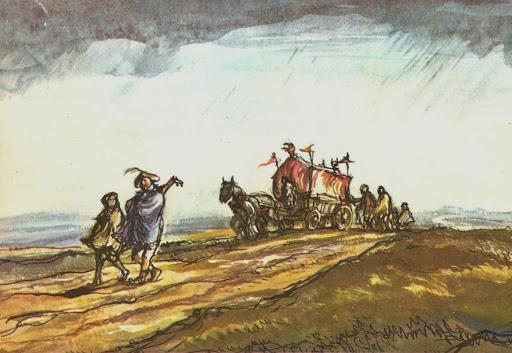
Friday
I have just reread Emily St. John Mandel’s luminescent Station Eleven (2014), a dystopian novel about a deadly pandemic that my brother Sam sent me a few years back. Bleak though the subject matter is, the novel also reminds us that art is always there to sustain us, even in the most unimaginable of circumstances.
Although civilization as been eradicated from the earth, a few people survive here and there, some of whom join “the Traveling Symphony.” Sometimes the musicians and actors play “classical, jazz, orchestral arrangements of pre-collapse pop songs,” sometimes they perform Shakespeare. The troupe’s motto, emblazoned on their cart and also tattooed on the protagonist’s arm, is “because survival is insufficient.” Art, in other words, is not a frill but a necessity.
Survival is still a concern, however. Travelers must be on the lookout for bandits, gangs, and “ferals,” even as they themselves may be shot at by terrified communities. There’s also a violent doomsday cult, led by a self-proclaimed prophet who cites the Book of Revelations and kidnaps women to be his wives. To defend themselves, the actors must know how to wield weapons as well as instruments.
In these dark moments, the Symphony’s faith in art’s sustaining power is challenged:
Sometimes the Traveling Symphony thought that what they were doing was noble. There were moments around campfires when someone would say something invigorating about the importance of art, and everyone would find it easier to sleep that night. At other times it seemed a difficult and dangerous way to survive and hardly worth it, especially at times when they had to camp between towns, when they were turned away at gunpoint from hostile places, when they were traveling in snow or rain through dangerous territory, actors and musicians carrying guns and crossbows, the horses exhaling great clouds of steam, times when they were cold and afraid and their feet were wet.
However, when they are grip of Shakespeare, everything else falls away, as when they are performing Midsummer Night’s Dream in a Michigan town. The all-too-relevant reference is the contagion and “rheumatic diseases” caused by the non-stop rain that arises out of Oberon and Titania’s quarrel. As the protagonist reflects, Shakespeare too was well acquainted with pestilence and death, but this did not stop his artistry. If anything, it spurred it:
What was lost in the collapse: almost everything, almost everyone, but there is still such beauty. Twilight in the altered world, a performance of A Midsummer Night’s Dream in a parking lot in the mysteriously named town of St. Deborah by the Water, Lake Michigan shining a half mile away. Kirsten as Titania, a crown of flowers on her close-cropped hair, the jagged scar on her cheekbone half-erased by candlelight. The audience is silent. Sayid, circling her in a tuxedo that Kirsten found in a dead man’s closet near the town of East Jordan: “Tarry, rash wanton. Am I not thy lord?”
“Then I must be thy lady.” Lines of a play written in 1594, the year London’s theaters reopened after two seasons of plague. Or written possibly a year later, in 1595, a year before the death of Shakespeare’s only son. Some centuries later on a distant continent, Kirsten moves across the stage in a cloud of painted fabric, half in rage, half in love. She wears a wedding dress that she scavenged from a house near New Petoskey, the chiffon and silk streaked with shades of blue from a child’s watercolor kit.
“But with thy brawls,” she continues, “thou hast disturbed our sport.” She never feels more alive than at these moments. When onstage she fears nothing. “Therefore the winds, piping to us in vain, as in revenge, have sucked up from the sea contagious fogs….”
Pestilential, a note in the text explains, next to the word contagious, in Kirsten’s favorite of the three versions of the text that the Symphony carries. Shakespeare was the third born to his parents, but the first to survive infancy. Four of his siblings died young. His son, Hamnet, died at eleven and left behind a twin. Plague closed the theaters again and again, death flickering over the landscape. And now in a twilight once more lit by candles, the age of electricity having come and gone, Titania turns to face her fairy king. “Therefore the moon, the governess of floods, pale in her anger, washes all the air, that rheumatic diseases do abound.”
Oberon watches her with his entourage of fairies. Titania speaks as if to herself now, Oberon forgotten. Her voices cries high and clear over the silent audience, over the string section waiting for their cue on stage left. “And through this distemperature, we see the seasons alter.”
We are experiencing our own moment of distemperature, altering our routines if not the seasons. Shakespeare, however, is still Shakespeare.

